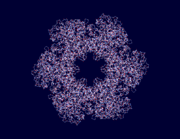Glutamine synthetase
From Proteopedia
| Line 13: | Line 13: | ||
==Classes== | ==Classes== | ||
| - | Glutamine synthetase has been described as having three destinctive types | + | Glutamine synthetase has been described as having three destinctive types.<ref name="Kumada">PMID:7916055 </ref> |
*Class I (GSI): Genes for this class have only been found in bacteria (eubacteria) and archaea (arhaebacteria. The paper by Kumada ''et. al'' goes into detail on these two.<ref name="Kumada">PMID:8096645 </ref> | *Class I (GSI): Genes for this class have only been found in bacteria (eubacteria) and archaea (arhaebacteria. The paper by Kumada ''et. al'' goes into detail on these two.<ref name="Kumada">PMID:8096645 </ref> | ||
*Class II (GSII): Genes for this class have only been found in eukaryotes and a few soil-dwelling bacteria.The paper by Kumada again, gets into further detail about these bacteria.<ref name="Kumada"> | *Class II (GSII): Genes for this class have only been found in eukaryotes and a few soil-dwelling bacteria.The paper by Kumada again, gets into further detail about these bacteria.<ref name="Kumada"> | ||
| - | *Class III (GSIII): Genes from this class have only been found in a few bacterial species.It is a hexamer of identical chains. It is much larger (about 700 amino acids) than the GSI (450 to 470 amino acids) or GSII (350 to 420 amino acids) enzymes | + | *Class III (GSIII): Genes from this class have only been found in a few bacterial species.It is a hexamer of identical chains. It is much larger (about 700 amino acids) than the GSI (450 to 470 amino acids) or GSII (350 to 420 amino acids) enzymes.<ref name="Brown">. |
Revision as of 22:38, 31 March 2010
Contents |
Glutamine Synthetase
Structure
An unrefined structure of glutamine synthetase is made of two layers, each containing 6 subunits, for a total of 12 subunits. [1] Each subunit contains an which is defined by a cylindrical shape formed by six antiparalel β starnds contributed by one subunit and two more strands by the neighbouring subunit. [1] In each cylindrical active site there are two Mn2+ ions: Mn 2+ 469 and 470. Both are attached to three protein chains and two water molecules, one of the water molecules are shared by both Mn2+. The protein ligands. Attached to Mn 2+ 469 is: Glu-131, GLu-212 and Glu-220, and the protein ligands attached to Mn 2+ are: Glu-129, His-269 and Glu-357.[1]
Unique to glutamine synthetase, unlike other enzymes, is it's "passive site". This refers to the central loop which is formed by a segment of the backbone that extends into the central aqueous cavity. [1]Unlike other sites in glutamine synthetase under the same conditions, this site is suceptible to proteolysis by four secreated proteases from the V8 protease of Staphylococcus aureus.[1]
Classes
Glutamine synthetase has been described as having three destinctive types.[2]
- Class I (GSI): Genes for this class have only been found in bacteria (eubacteria) and archaea (arhaebacteria. The paper by Kumada et. al goes into detail on these two.[2]
- Class II (GSII): Genes for this class have only been found in eukaryotes and a few soil-dwelling bacteria.The paper by Kumada again, gets into further detail about these bacteria.[2]
References
- ↑ 1.0 1.1 1.2 1.3 1.4 Yamashita MM, Almassy RJ, Janson CA, Cascio D, Eisenberg D. Refined atomic model of glutamine synthetase at 3.5 A resolution. J Biol Chem. 1989 Oct 25;264(30):17681-90. PMID:2572586
- ↑ 2.0 2.1 2.2 Brown JR, Masuchi Y, Robb FT, Doolittle WF. Evolutionary relationships of bacterial and archaeal glutamine synthetase genes. J Mol Evol. 1994 Jun;38(6):566-76. PMID:7916055
| Please do NOT make changes to this Sandbox until after April 23, 2010. Sandboxes 151-200 are reserved until then for use by the Chemistry 307 class at UNBC taught by Prof. Andrea Gorrell. |
Proteopedia Page Contributors and Editors (what is this?)
Michal Harel, Rhiannon Khela, David Canner, Andrea Gorrell, Alexander Berchansky, Jaime Prilusky


